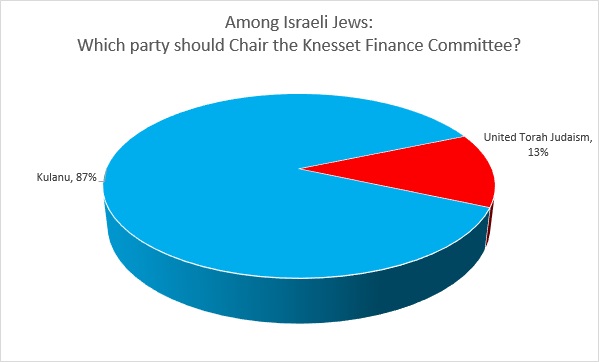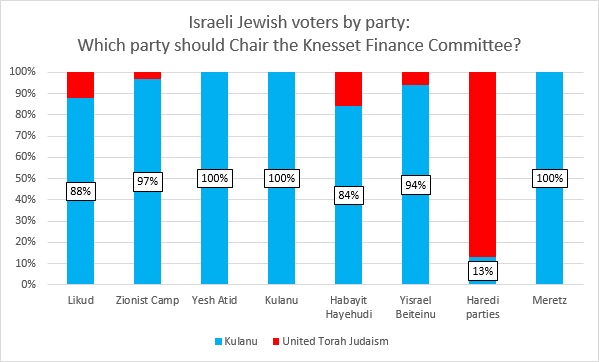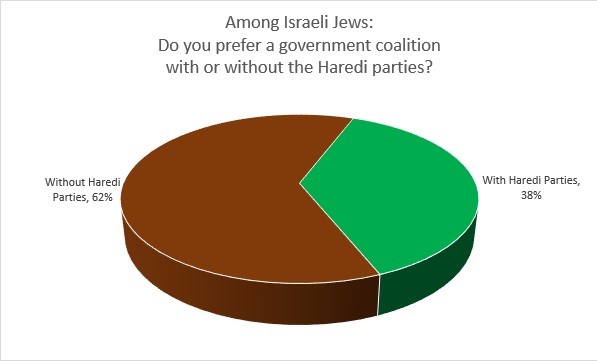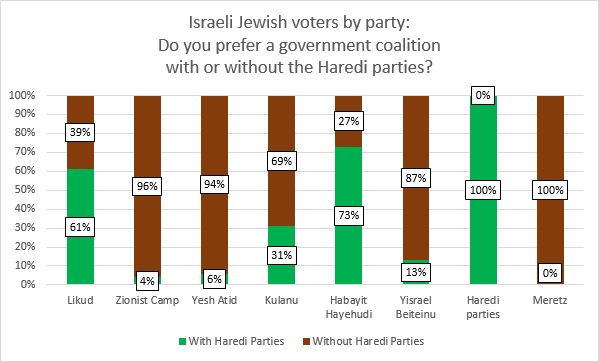Voters Respond: Haredi Parties - in or out?
Overwhelming majority of voters STILL want Ultra-Orthodox Parties out of coalition
According to a March 24 poll conducted by Rafi Smith Polling Institute for Hiddush – Freedom of Religion in Israel, 62% of Israelis support a government without the ultra-Orthodox parties; 87% prefer that control of the Knesset Finance Committee be given to Kulanu, rather than United Torah Judaism (UTJ).
Uri Regev 26/03/2015 16:47
Tags: elections · knesset · Hiddush Polls

ballots
With the 2015 Israeli elections now behind us, Hiddush’s polls have focused on the role that religion/state matters will play on the formation of the next government coalition in the voters' minds. The results of our March 24 poll are unequivocal: The public strongly opposes a government that includes coalition partnership with the two ultra-Orthodox parties. The overwhelming majority of the public support MK Moshe Kahlon’s bid for the chairmanship of the Knesset Finance Committee over ultra-Orthodox MK Rabbi Moshe Gafni of the United Torah Judaism party!
As PM Netanyahu’s promises to the ultra-Orthodox parties are publicized, it is important to shed light on what the public actually wants. The 2013 elections sent a warning against cynical dismissal of public will, as demonstrated in Hiddush’s analysis (link). With this knowledge, Hiddush’s polling and advocacy efforts take on particular importance, given what’s in store (link) if the coalition partnership with the ultra-Orthodox is resumed, particularly if MK Rabbi Moshe Gafni is once again allowed to divert billions of NIS of government funding every year (link) for yeshivas and other ultra-Orthodox institutions without Knesset approval as Chairman of the Finance Committee.
Let’s take a close look at what the public wants: This latest poll conducted by the Smith Institute, commissioned by Hiddush, shows that fully 62% of Israeli voters do not want to see the ultra-Orthodox parties in the next coalition government, and 87% prefer that control of the Knesset Finance Committee be given to Kulanu, rather than the sectarian United Torah Judaism (UTJ). Only 13% support giving control of the Finance Committee to UTJ. Even 88% of Likud voters support Moshe Kahlon’s Kulanu party running the Knesset Finance Committee instead of placing it in the hands of the Haredim.
These clear results are not rooted in animosity towards the Haredim but in an understating of the devastating result of continuing to place the “control switch” to Israel’s finances in the hands of sectarian parties.
These clear results are not rooted in animosity towards the Haredim but in an understating of the devastating result of continuing to place the “control switch” to Israel’s finances in the hands of the sectarian Haredi parties. A Likud-Haredi government will put in jeopardy our country’s future. It’s time for the Prime Minister to heed the Israeli public’s unequivocal wishes.
62% of the Jewish population prefers the establishment of a government without the ultra-Orthodox parties and with a party from the center or left-wing. Only 38% support the establishment of a right-wing-Haredi government. These were the results of the March 24 survey conducted for Hiddush by the Rafi Smith Polling Institute. The Internet survey polled approximately 500 Israelis representing the state’s adult, Jewish population.
96% of secular Jews, 96% of immigrants, 95% of traditional Jews and 73% of Zionist religious Jews prefer that the Knesset Finance Committee be administered by Kulanu, rather than UTJ. The only demographic whose majority prefer that the Knesset Finance Committee be under the control of UTJ was the ultra-Orthodox population – 93% supported this.

So what were the preferences of voters who supported the parties that are likely to form the next coalition? 100% of Kulanu voters, 88% of Likud voters, 94% of Yisrael Beiteinu voters and 84% of Habayit Hayehudi voters support giving Kulanu authority over the Knesset Finance Committee, rather than UTJ. Among those who voted for the ultra-Orthodox parties, 87% support giving the Knesset Finance Committee to UTJ.

As to the desired make-up of the next government, according to the survey, 62% of Israel’s Jewish population prefer a government without the ultra-Orthodox parties, and would rather have a centrist party or left-wing party in their place. This includes 87% of secular Jews, 85% of immigrants and 60% of traditional Jews. Still, 91% of Zionist religious Jews and 100% of ultra-Orthodox Jews prefer that Shas and UTJ sit in the coalition.

The picture is further complicated among the parties that are likely to form the next coalition: 61% of Likud voters and 73% of Habayit Hayehudi voters prefer a government with the ultra-Orthodox parties. However, 69% of Kulanu voters and 87% of Yisrael Beiteinu voters prefer a government without Shas and UTJ. 100% of those who voted for the ultra-Orthodox parties prefer a coalition that includes these two parties.

This survey proves how important a civil, non-sectarian government is to the general population, which is essential if Israel is to strengthen civil society and a civil agenda, preferred by the overwhelming majority of Israelis. It further indicates how important it is to Israelis that the Knesset Finance Committee be administered by a non-sectarian party, and even those parties which share a right-wing political outlook and may not be opposed to forming a coalition with the Haredi parties, understand and oppose the devastating outcome of placing the keys to the Finance Committee in Haredi hands.
The expected demands of the ultra-Orthodox parties upon the government, which were documented by Hiddush, revealed that a Likud-ultra-Orthodox government would essentially sell off Israel’s economic future in a fire sale. Israelis want to see the extremist, ultra-Orthodox parties outside of the coalition so that they cannot do further damage to Israeli society, not only by the billions of shekels they will demand in subsidies but also by rolling back much of the progress made in the last couple of years towards greater Haredi participation in the workforce, enlistment in the IDF and incorporation of core-curricular studies into the state funded Haredi education system. One hopes that the Prime Minister will heed the people’s will.
it’s doubtful there has ever been a Knesset Finance Committee Chairperson more sectarian than MK Rabbi Moshe Gafni.
In fact, it’s doubtful there has ever been a Knesset Finance Committee Chairperson more sectarian than MK Rabbi Moshe Gafni. A comprehensive Hiddush report revealed that during MK Gafni’s tenure as Head of the Finance Committee prior to the 2013 elections, an average of a billion shekels were allocated beyond the amounts approved in the State Budget to further Gafni’s religious agenda and distributed to ultra-Orthodox institutions.
The significance of this survey also relates to the impact of the next Israeli government on Diaspora Jewry and Jewish Peoplehood. A coalition government that depends on the Haredi parties will further erode the relationship between Israel and the majority of world Jewry, and undermines Jewish unity and peoplehood. The clear majority of Israelis and Jews outside Israel share in the vision of an Israel that embraces Jewish diversity and religious freedom, allows freedom of marriage and promotes the identity of Israel as a Jewish and democratic state. All of that has been undermined by previous coalitions that depended on Haredi parties and will be countered again in the coming years if they are brought back into the government and given control over key Ministries and State agencies. We hope that if this occur, against the will of the public that collaborative efforts between Israelis and world Jewry will grow to ensure Israeli’s religious pluralism and civil society.